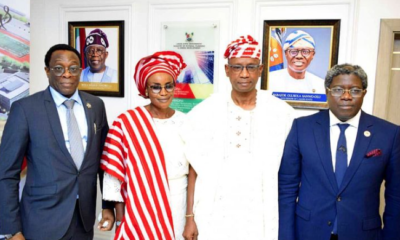Education
Senate Confirms Minimum Age Requirement For Admission Into Universities


The Nigerian Senate has made it clear that the statements regarding the potential increase of the age limit to 18 years were individual viewpoints.
The Senate stressed that any adjustments to the age limit would require proper legislative procedures, whether they involve lowering or raising the limit.
Chairman of the Senate Committee on Media and Public Affairs, Adeyemi Adaramodu, made this known in an interview with journalists on Wednesday.
Read Also: FG Engages Russian Builders To Resuscitate Ajaokuta Steel
The Nigerian Senate has made it clear that the statements regarding the potential increase of the age limit to 18 years were individual viewpoints.
The Senate stressed that any adjustments to the age limit would require proper legislative procedures, whether they involve lowering or raising the limit.
Chairman of the Senate Committee on Media and Public Affairs, Adeyemi Adaramodu, made this known in an interview with journalists on Wednesday.
Recall that last week, Prof. Tahir Mamman, the Minister of Education, stated that the government is thinking about changing the minimum age for entering universities to 18 years old.
“Comment on the minimum age requirement for admission is not a law,” the lawmaker said.
“So it is just an opinion. It’s not a law. By the time the Senate resumes, whoever wants to bring that one out to make it a law, will now bring it and then the procedures will take place.
“You can bring whatever to the floor in form of a bill. When you bring it, there’s going to be public hearing.
“All the stakeholders will sit down and talk about it. The parents, teachers, legislators, civil society organisations, even foreign organisations.
“We will sit down and talk. Even if they say that the minimum age should be 30 or 12, we will all discuss it in an open forum. So it’s still a comment which cannot be taken to be the law.”
Education
Shettima Launches NEDC-ASSEP Programme To Address School Dropouts In North East


Vice President Senator Kashim Shettima yesterday launched the Accelerated Senior Secondary School Education Programme (ASSEP) initiated by the North-East Development Commission (NEDC) in collaboration with the Vice President Office to reduce the number of post-primary dropouts due to the decline in secondary school enrollment in the subregion which stands at 15 percent, one of the lowest in the country.
Read Also: NLC Shuts Down IBEDC Premises Over Electricity Tariff Hike
The managing director/CEO of the commission, Alh Mohammed Alkali said the Stabilisation and Development Master Plan (NERSDMP) developed by the North East Development Commission and its diverse partners consists of pillars that support human capital development in the subregion which caters for both human capital facilities – infrastructure, teaching/learning material, etc – estimated to cost over N1 trillion.
Alkali made the remark at the launching of the Accelerated Senior Secondary School Education Programme (ASSEP) performed in Bauchi on Saturday by the vice president.
ASSEP seeks to boost the post-primary education rating across the subregion through three major objectives – improved enrolment into tertiary institutions, skills development and elevation of teacher quality.
Alh Alkali assured that the commission is poised to develop and support the children and youth of the Northeast subregion to grow, develop and compete with the best across the world in various fields, excel and contribute to further development of the six states, subregion and country as a whole.
The managing director expressed gratitude to the federal government, especially the vice president, for the deep interest and commitment to human development in the North-East, saying they would be counting on the continued support of state governments, federal government as well as other partners.
Alkali disclosed that the commission has also plowed other funds into human capital training and retraining programmes that could propel socio-economic development of the subregion, saying “This underscores the premium we place on building our people and their capacity to make concrete social and economic contribution.
“Therefore, the Accelerated Senior Secondary Education Programme (ASSEP) we have gathered here to launch today is an intervention focused on addressing a particular challenge in our region’s education system; it will provide effective support where the capacity of conventional schooling arrangements is limited for our teeming beneficiaries.”
He attributed this to the challenges in the post-primary education segment, citing JAMB/UTME applications and admissions into tertiary institutions in 2019 where northeast students’ performance was one of the poorest in the country.
He further noted that nationally, the North-East subregion has the lowest number of teachers and the highest percentage (55 percent of those available) are without literacy skills.”
Vice President Shettima had earlier launched the programme regretting that post primary enrolment in the Northeast is 19 percent which is far below the national average of 39 percent.
Education
Oyo State Governor Approves Recruitment of 7,000 Primary School Teachers


Governor Seyi Makinde of Oyo State has approved the recruitment of 7,000 teachers into public primary schools in the state.
The government also approved the recruitment of 100 caregivers in special schools across the state.
Read Also: Osun State: NNPP Vows To Unseat Adeleke In 2026
Nureni Adeniran, the Oyo State Universal Basic Education Board (SUBEB) chairman, disclosed this in Ibadan on Friday at a news conference.
Mr Adeniran said this was in fulfilment of Mr Makinde’s electioneering promise and fulfilment of the yearnings of the people of the state.
He explained that the recruitment process would commence soon, urging intending applicants to be wary of scammers who defraud unsuspecting members of the public.
Mr Adeniran said information regarding the recruitment exercise would only emanate from the board, adding that no authorization had been given to a third party to act on behalf of the government or the board.
The SUBEB boss said the intending applicants would not pay any amount to anybody on account of the recruitment.
“This press conference is the first stage of the recruitment process; the next stage will be made known as well as the requirements.
“The board will comply with the directive of the governor that the exercise will be conducted based on merit,” Mr Adeniran said.
He, however, urged intending applicants to apply based on their local government areas, adding that teachers would be posted to teach there.
According to him, it will solve the problem of having to transfer teachers later and ensure that every local government is adequately catered for.
He said the recruitment would address about 70 per cent of the manpower shortage.
He added that the exercise would be inclusive, with special consideration for persons with disabilities.
(NAN)
Education
Kwara State Government Issues Stern Warning to School Principals Over Illegal Charges


The Kwara State Government has cautioned principals of Junior Secondary Schools and head teachers of primary schools throughout the state against imposing unlawful fees for the state placement examination (Common Entrance).
Read Also: I Have No Hand In Shaibu’s Impeachment – Ighodalo
Hajia Sa’adatu Modibbo Kawu, the state Commissioner for Education and Human Capital Development, delivered the warning on Tuesday from her office in Ilorin.
She stressed that the common entrance examination is free of charge and firmly stated that the government will not tolerate any form of extortion from pupils under any pretext, as the examination is fully funded by the state government.
Hajia Modibbo Kawu urged school principals and head teachers to refrain from engaging in activities that could tarnish the reputation of the state government.
Additionally, she cautioned against involvement in or condoning examination malpractices, asserting that the current administration has a zero-tolerance policy towards such acts.
The commissioner encouraged parents and guardians to promptly report any principal or head teacher suspected of engaging in questionable activities directly to her office, reiterating that her office is open to all concerned parties.
-



 Entertainment1 year ago
Entertainment1 year agoThe Story Of A Woman With Unusual Long Backside, Sarah Baartman
-



 Entertainment1 year ago
Entertainment1 year agoTallest Man In Nigeria Afeez Agoro Cries Out To Nigerians For Financial Support After Chronic Arthritis Diagnosis As SFCOBA 94Set Pays Him Visit
-



 Business2 years ago
Business2 years agoNigeria Vs Ghana: Authentic Nigeria Football and Allied Sports Supporters Club Seals Sponsorship Deal with 86Z Football Technology Limited Foots
-



 Education2 years ago
Education2 years agoTokunbo Wahab: An uncommon legal eagle soaring daily to a greater place in history
-



 News8 months ago
News8 months agoPhysical Planning Commissioner, Oluyinka Olumide Assumes Office …Harps On Transparency, Zero Tolerance To Building Collapse
-



 Featured1 year ago
Featured1 year agoBuruj Football Club’s Players Moving To Europe Delights Obesere
-



 Sports11 months ago
Sports11 months agoVictor Osimhen Returns To Roots As Football Superstar Visits Primary School And Inspires Young Talent
-



 Featured2 years ago
Featured2 years agoQatar 2022 World Cup Playoff: Black Stars Hold Eagles To Scoreless Draw In Kumasi




